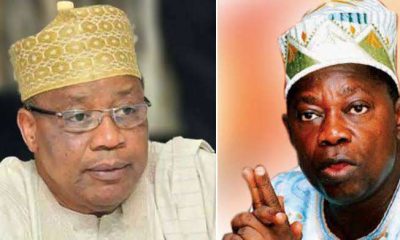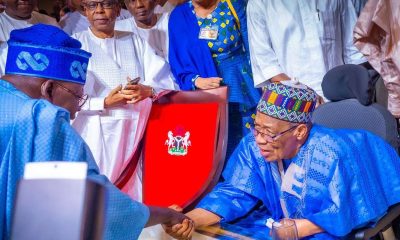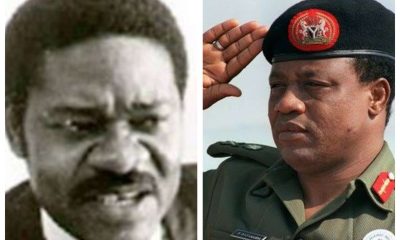Politics
IBB, former military president, divides Nigerians more over June 12

...as ‘A Journey in Service,’ a memoir, ignites fresh controversy
• “He lied,” – Gen. Abacha’s family
• “We are vindicated,” – Abiola’s family
• “He is a coward,” – Odinkalu
General Ibrahim Badamosi Babangida, IBB, is a controversial Nigerian leader and may even die still being so. The former military president, who held the nation spellbound by his dexterous charm, deft moves, and Machiavellian tactics for eight years, had been in the political wilderness for more than 30 years, ravaged by radiculopathy, a consequence of a bullet wound in his leg.
Buried in the recesses of his wilderness experience were many deep secrets and complexities around what he did and did not do when in power, especially the truncation of the June 12 presidential election, which, by his admission, was the fairest poll ever conducted in the country.
But last week, his much-awaited biography was released, and since then, all hell has broken loose, bringing back all the old issues and controversies about him and his actions.
The man who variously goes by many pejorative monikers: evil genius, Maradona, Machiavellian, has continued to surprise many, anger many, and disappoint many more. The book, beyond the acceptance of guilt and official open acknowledgment of the winner, and, of course, a humongous sum of over M20 billion raised on the spot, is a kind of anticlimactic;
First, the book launch itself was a roll call of who-is-who in the past and present public life, many of them claiming wealthy descent from Babangida’s large-heartedness and good nature.
Before the event came to a close, accusations were already flying around to dispute his indulgent and self-serving claims.
Hailstone of reactions
“All hail the Grand Commander of the Order of Cowardice!” is how someone welcomed the book, in which he blamed every other person, especially the dead, for the infamy of his regime. In Africa, people are careful to speak I’ll of the dead because they can’t reply; it is unfair.
“Babangida is Lying!” – Abacha’s son explodes over the June 12 annulment revelation, which is another reaction.
“…. Sadiq Abacha defends his father’s legacy, insists history will vindicate him despite Babangida’s revelations.
One of Abacha’s sons, Sadiq Abacha, has hit back at critics, insisting that his father remains one of the country’s most significant leaders, despite continuous criticism.”
In a strongly worded Facebook post on Saturday, Sadiq alleged that his father was a victim of envy and subtle betrayal, emphasizing that history will ultimately vindicate him.
This revelation has sparked outrage among political analysts and historians, many of whom believe Babangida is attempting to shift blame for one of Nigeria’s most controversial political decisions.
“The man Abacha—you have always been the one they envied with silent deceit. History shall remember you for being a better leader, no matter how much they try to put you down,” Sadiq wrote.
“As a son, I am most proud of you today. You indeed are the man they wish they were half of,” he added.
Sadiq ended his post with a Hausa proverb, “Duk wanda yayi jifa a kawa,” which translates to, “Whoever throws a stone in the market…”—a subtle warning that actions always have consequences.
M.K.O. Abiola family
Hafsat Abiola-Costello, daughter of the late MKO Abiola and Kudirat Abiola, reacted to the revelation by former military leader, Gen. Ibrahim Badamasi Babangida (Rtd.) that Abiola won the June 12, 1993 presidential election.
The daughter noted that the importance of June 12 goes beyond them, as it represents the collective hope of Nigerians for a better and more united country.
The statement reads, “When anyone mentions June 12, my mind always goes to MKO and Kudi. But June 12’s staying power was because the vote that Nigerians expressed that day was a vote for a better future and unity. MKO may have been the symbol of the Hope ‘93 campaign but June 12 was
for those who kept expressing doubt that Nigerians had spoken so decisively on that day, I’m glad that General IBB’s admission that MKO won the election can now lay the matter to rest.
“It’s sad that such a galvanizing statement as the breakthrough vote for MKO should have been truncated by an unjust annulment. But I will be forever grateful to both MKO and Kudi for not allowing their fears for their safety to stand in the way of the people’s desire for a better Nigeria. May such commitment endure.”
Nigerians speak
As reactions to Babangida’s memoir continue to pour in, many political observers believe this latest controversy could reshape public opinion on key historical events in Nigeria’s governance. The debate over the June 12 election annulment and Abacha’s role in Nigerian politics is set to linger as more details emerge.
But for Peter Obi, the Labour Party presidential candidate in the last general elections, Babangida wasn’t a bad apple, he said Nigeria is in a worse condition today than it was during the administration of former military president, General Ibrahim Badamasi Babangida (IBB).
Obi made the statement last Thursday after attending the launch of Babangida’s autobiography, A Journey in Service, at the Transcorp Hilton in Abuja.
“In the case of Nigeria, we are worse off than we were during IBB’s era,” he said. “Using our contemporary peers as a benchmark, when IBB left office in 1992, countries like Bangladesh, India, Vietnam, and Ghana were all in the low Human Development Index (HDI) category—just like Nigeria. Today, however, these nations have advanced to medium and high HDI levels, while Nigeria remains in the low HDI category, having either stagnated or declined.”
The former Anambra governor also commended Babangida’s contributions to Nigeria’s economy, particularly in fostering entrepreneurship and private sector growth
“IBB’s contributions to Nigeria’s economy and his strong support for entrepreneurship and private sector growth remain immeasurable,” Obi stated. “He played a key role in fostering a united and equitable Nigeria, ensuring policies that strengthened national cohesion and economic development.”
A lethal shot from respected human rights lawyer and former Chairman of the Nigerian Human Rights Commission (NHRC), Prof. Chidi Odinkalu, knocked down Babangida for filling his autobiography, “A Journey In Service,” with lies.
Odinkalu noted that the former dictator deliberately waited until all the people he accused died before launching the book he filled with allegations against dead men and women, who could no longer controvert his claims and allegations against them.
The respected lawyer and scholar described Babangida as the “Grand Commander of the Order of Cowardice,” who portrayed himself in the book as a victim of dead men and women.
In his acerbic reaction to the contents of the book, Odinkalu in a series of posts on his X page on Friday said, “Ibrahim Babangida’s book is filled with allegations against dead men and women.
“He waited until they were all dead and none of them could controvert him and he portrays himself as a victim of all these dead men and women.”
“This damns him even more than he already was as lacking in character.
“The only question that must be pursued by those interested must be how a man so devoid of character and values was allowed to travel so far in the military to the point where, for a generation, he could routinely pick and choose at his whim which soldier could or should rule Nigeria.
“Conveniently, Babangida, a committed record-keeper, could not produce any contemporaneous records, minutes, notes, or other evidence to corroborate any of the serious claims and allegations he makes about these dead men and women.
Another human rights activist and lawyer, Dele Farotimi shared Odinkalu’s sentiments. Farotimi noted that in a conscious society, former military ruler, Gen. Ibrahim Badamasi Babangida retd. (IBB), would not dare to appear in public.
Farotimi noted that in a country like Nigeria, which he described as a “crime scene,” Babangida enjoys the status of a statesman.
“To die for a people devoid of memory is to be killed over and over, again and again,” Farotimi said.
“In a place inhabited by the conscious, IBB would not dare to show his face in public. But in the crime scene that doubles as our country, having been succeeded by even more villainous rulers, Badamasi is installed in the seat of the statesman. Tueh.”
Economic Performance
There’s no consensus or agreement on Babangida persona, he is like the proverbial elephant described by seven blind men, that means different things to different people,” declared Professor Adeagbo Moritiwon, a political scientist and a long-time Babangida watcher. What is at issue is the interpretation and worth of his legacies.
There was also an enlightening debate on our platform signposting the enigma of his persona. On the economic legacy, a top editor, author, and public affairs commentator who is working on a book on privatization, Uche Chris noted that “IBB carried out the most credible and transparent privatization program under Dr. Hamzat Zayyed, as chairman of TCPC, (Technical Committee on Privatization and Commercialization), which later in 1999, became BPE (Bureau for Public Enterprises). It was Obasanjo who messed up the privatization program by changing the focus from “core investors with technical expertise and financial capability,” to just the highest bidder. IBB deserves no defense from anybody, but history and record should not suffer because of his perceived wrongdoings.’
But not everyone agrees. Dr. Olufemi Omoyele of the Department of Entrepreneurship at Osun State University differed on the economic legacy. “Babangida opened up the banking sector, and it’s the reason we have many of them today through his liberalization program, but it was not holistic as it created a cream of bankers who refused to play by the rules. Did they lend to investors on small scale businesses, and it’s precisely what can lead to growth and development.”
Another commentator and editor, Ayoola Olaoluwa, noted that Babangida did much to develop the economy, he noted.
“While I never liked IBB and I don’t think I will ever do, I believe his privatisation exercise, continued by successive military administrations, was the best the nation ever had when compared with post-1999 exercises.
Yes, he has his failings, especially his anti-democratic shortcomings,
but he did well in some areas.
IBB’s TCPC exercise was more about opening up the economy, not about selling of national assets like the ones embarked upon by the administrations of Obasanjo and Jonathan that sold national assets to largely unqualified cronies.
I will mention a few sectors here where IBB’s privatisation exercise produced tremendous impacts: Banking, Media, Telecoms, and Education.
Before IBB’s privatization exercise, we only had federally owned TV and radio stations, NTA and FRCN, as well as state government stations like LTV Lagos and others. No private stations.
I remember NTA stations used to open by 4.45 pm and shut down by 11.45 pm (just 7 hours of operations).
But instead of selling the public TV and radio stations, licences were given to new ones. This resulted in the establishment of the first radio and TV stations in Nigeria, Raypower FM in September 1994 and AIT in 1996, to broadcast for 24 hours. Other private stations later joined the fray.
We should not also forget the liberalization of the banking sector.
Who still remembers the days of Tally Numbers, where bank customers used to pick numbers, sometimes picking up to number 200 to do banking transactions? I remember a year that I picked tally number 127 at the Afribank, Dugbe, Ibadan branch in January 1990 around 9.45 am. I later left the bank to do other things, believing that by the time I came back, the queue would have disappeared.
But alas, when I showed up at the bank around 2 pm, they were still attending to customer 98. It was that bad.
At that time, you could not do banking transactions outside the branch where you opened your account.
But that changed with the liberalization of the sector in the early 90s by IBB, which led to the birth of the likes of GTBank in January 1990, Zenith Bank in May 1990, and later STB, made it possible for customers to transact business at any of its branches across the country notwithstanding the branch the accounts were opened.
Abacha inherited the TCPC plan, which he continued. And I will choose the telecoms sector as a reference point. Instead of selling NiTEL, his administration opened up the sector to new investors. The sector was already opened before Obasanjo took over. The licence initially given to Adenuga was awarded to the Chagourys by Abacha but was revoked in court, which was why Adenuga asked for a sovereign guarantee of the licence.
Also, IBB’s privatisation blueprint for the education sector was embraced by its successors. This was confirmed by former minister of education, Prof. Babs Fafunwa, in an interview he granted to the old Hallmark Newspaper in 2004 (20 years ago).
Instead of selling public universities, the plan recommended giving licenses to new ones. That culminated in the establishment of the first private university in Nigeria, Babcock, on 20th April 1999, one month before Obasanjo assumed power as a civilian president. Other varsities like Bowen and Igbinedion soon followed.”
Many analysts agree that the book is sheer revisionism of history to give the dribbling general a soft landing. Dr. Adeyanju Dickson, a political scientist, notes that “the book is the general’s shoddy attempt to rehabilitate himself. And the crowd of military cum political class that went there has merely legitimized the validity of the sociologist Robert Michel’s position in his book: Political Parties, where he laid out his ‘iron law of oligarchy’. The truth is that the oligarchy that controls Nigeria remains united, they know how to settle their petty quarrels over spoils of office. Babangida has been rehabilitated in the twilight of his life.”
Author and editor Richard Mammah told Business Hallmark that the book failed to address the core issues raised by his eight years in power: Gloria Okon, the alleged $12 bn Gulf war oil windfall, which the general said he used to develop Abuja and Dele Giwa. He lashed out at his endless transition program that gulped billions without anything to show for it.
The book, though an attempt to present his side of history, has inadvertently opened a new discourse on the Babangida years and their impact on contemporary situations in the country.









